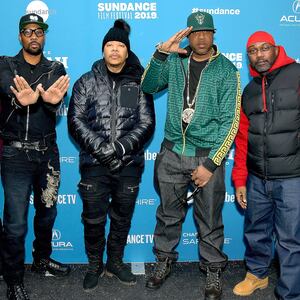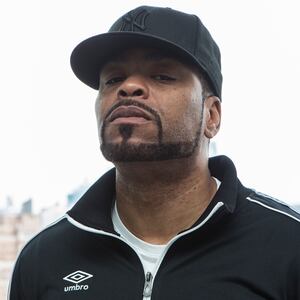It would make sense for Wu-Tang: An American Saga to emphasize, in its narrative and on its soundtrack, music by the famed hip-hop group. Which is why it’s so puzzling that it has no interest in meeting those predictable expectations.
Dramatizing the origin story of the famed Staten Island crew as a pastiche of every gangster and drug-dealing cliché imaginable, Hulu’s eight-part series (premiering Sept. 4) is both ill-conceived and consistently dull. Created and written by Alex Tse and RZA (who executive-produces alongside Method Man), Wu-Tang: An American Saga paints a portrait of inner-city trials and tribulations that feels like a third-rate photocopy of The Wire, glorifying the very sort of behavior and milieu that, presumably, its characters are trying to escape—first by selling drugs, and then through music. Only alive when its protagonists are crafting beats and verses, it requires twice as long as Showtime’s recent doc Wu-Tang Clan: Of Mics and Men to say half as much.
Set in the late ‘80s and early ‘90s, Wu-Tang: An American Saga’s nominal center of attention is Bobby Diggs (Moonlight’s Ashton Sanders), destined to become RZA, the founding member of the Wu-Tang Clan, who brought together a diverse array of local rappers to form a pioneering supergroup. Here, he’s introduced as a kid who loves constructing songs on his basement turntables. At the same time, he works for his older brother Divine (Julian Elijah Martinez), who sells drugs with partner Dennis (Siddiq Saunderson), aka Ghostface Killah, in order to support his mom Linda (Erika Alexander), sister Shurrie (Zolee Griggs), and brother Randy (Justus Davis-Graham). That illegal trade also puts food on the table for Dennis’ drunken mother and two disabled brothers, for whom he cares when not carrying on a secret affair with Shurrie behind the backs of his best friends.
Wu-Tang: An American Saga benefits from the charisma of its stars, led by Sanders as Bobby, whose passion for music is so all-consuming that, at one point, he almost fails to comprehend that his house is on fire while listening to songs blaring out of his headphones. Bobby is committed to making it as a hip-hop star, and his early obsession is finding a way to procure enough money to buy the SP-1200 sampler (this after he fails to steal the enormous gear in his not-enormous backpack). Once Divine winds up behind bars, however, Bobby has to assume man-of-the-house status and run his brother’s drug operation, and Sanders’ wounded eyes convey Bobby’s caught-between-two-worlds predicament: wanting to do what’s necessary to keep a roof over his loved ones’ heads, and yearning for something more than street hustling.
Alas, hustling dominates Bobby’s life during this period, and thus Wu-Tang: An American Saga rarely expends more than a few minutes of each episode depicting the kid dreaming up new sounds and lyrics, either alone or with friends (like TJ Atoms’ Ol’ Dirty Bastard, who’s relegated to a jokey afterthought). The focus is squarely on gangster spectacle of a drearily formulaic variety. In this Staten Island community, there’s a heated rivalry between the dope-peddlers of the Park Hill and Stapleton projects (Bobby and company are residents of the latter), and the series begins with a drive-by shooting of Dennis’ home by Park Hill bigwig Power (Marcus Callender) and his right-hand man Sha (Shameik Moore), aka Raekwon, who’s close childhood friends with Bobby. Sha turns to Bobby to stash the guns used in this attack, despite the fact that Bobby is also partners-in-crime with Dennis, which proves the first of the aspiring musician’s many gangland-related dilemmas.
Though characters frequently watch (and sporadically talk about) the martial arts movies that helped inspire Wu-Tang’s sound and philosophy, Wu-Tang: An American Saga treats the most compelling parts of the Wu-Tang Clan’s story—namely, the incidents and influences that directly led to their formation—as secondary concerns. Its prime interest is the hackneyed drug-dealing shenanigans of Bobby, Dennis, Sha and a collection of other Gangster 101 types. There’s absolutely nothing novel or engaging about this material, nor is it treated with any sort of critical eye. Even when an older woman chastises her young neighbors for their profane misogyny and all-around criminality, Wu-Tang: An American Saga makes sure to humiliate her before casting its street-hustler figures as the true victims of circumstance and prejudice.
There are plenty of other conventional elements to be found throughout Wu-Tang: An American Saga’s eight installments, such as the from-different-sides-of-the-track romance between Dennis and Shurrie, the reappearance of Linda’s abusive ex Jerome (Bokeem Woodbine), and the violent prison ordeal of Divine. Some of this is undoubtedly true, and some of it feels, let’s say, melodramatically embellished. But almost none of it is fresh from a storytelling perspective, and—given that it often revolves around Divine, Shurrie, or some other non-Wu-Tang Clan member—it comes across as beside the point. The main reason anyone has tuned into RZA and Tse’s show is to get a three-dimensional sense of the young up-and-coming rappers themselves. Yet far too often, they’re pushed aside by been-there, done-that action.
Director Chris Robinson attempts to gussy things up via the occasional flourish, most notably cartoon interludes during the second episode and a videogame-POV sequence (which plays on the notion of drug-slinging as “The Game”) involving a doomed Wu associate. Unfortunately, those touches are as clunky as they are random, and only further reinforce the impression that Wu-Tang: An American Saga knows that the Wu’s origins aren’t interesting enough on their own to merit a TV series, and therefore must be inflated with aesthetic tricks and derivative drug-dealing conflicts—as well as perfunctory flashbacks to Bobby’s youthful experiences in North Carolina with a kind uncle and demanding aunt, which vainly strive to flesh out his motivations.
Eventually, more Wu members enter the picture, including Method Man (Dave East, as Shotgun). However, any sense of their distinctive personalities is drowned out by incessant scenes of underworld bigwigs talking tough, concocting money-making schemes, or planning to take out adversaries. So standard issue that it’s difficult to tell fact from fiction, Wu-Tang: An American Saga renders its magnetic subjects exactly what they’re not: forgettable.








